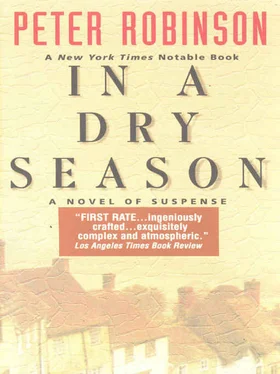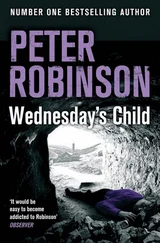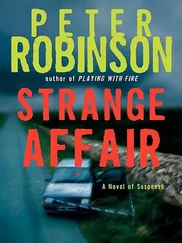Next, she noticed the subtly distorted perspective, probably a result of cubist influences. The mill was there, perched on the rise in the top left corner, and though it looked as if it should dominate the scene, somehow, by some trick of perspective over size, it didn’t. It was just there. The church, just to the right of the river, managed much more prominence through its dark and subtly menacing square tower and the rooks or ravens that seemed to be circling it.
The rest of the composition appeared simple and realistic enough: a village High Street scene whose people reminded her of Brueghel’s. There was a lot of detail; an art teacher might even describe the work as too busy.
The villagers were doing the normal things – shopping, gossiping, pushing prams. Someone was painting a front door; a man straddled a roof repairing a chimney, shirt-sleeves rolled up; a tall girl stood arranging newspapers in a rack outside the newsagent’s shop; a butcher’s boy was cycling down the High Street beside the river with his basket full of brown-paper packages, blood-streaked apron flapping in the wind.
The rows of houses on each side differed in size and design. Some were semis or terraces, front doors opening directly onto the pavement, while some of the larger, detached houses stood back behind low stone walls enclosing well-kept gardens. Here and there, on the High Street side, a row of shops broke up the line of houses. There was also a pub, the Shoulder of Mutton, and its sign looked crooked, as if it were swinging in the wind.
Normal life. But there was something sinister about it. Partly it was the facial expressions. Annie could detect the smug, supercilious smiles of moral rectitude or the malicious grins of sadism on the faces of so many people. And Stanhope had included so much detail that the effect had to be deliberate. How he must have hated them.
If you looked long enough, you could almost believe that the man on the roof was about to drop a flagstone on some passerby, and that the butcher’s boy was wielding a cleaver ready to chop off someone’s head.
The only characters who looked in any way attractive were the children. The River Rowan was neither very wide nor very deep where it ran through the village. Children were playing in the shallows, splashing one another, paddling, the girls with their skirts gathered around their thighs, boys in short trousers. Some of them looked angelic; all of them looked innocent.
The more Annie looked, the more she recognized that there was something religious, ecstatic, in the children’s aspects, and the link with the water also brought to mind baptism. It was a sort of religious symbolism reminiscent of Stanley Spencer, though not quite so blatant. Over it all, the church brooded with its sense of menace and evil. The mill was nothing but a husk.
Annie looked away. When she turned back, the scene appeared more normal, and she noticed the strange colors the most again. It was a powerful work. Why had she not heard of Stanhope before?
In the bottom right, just above the artist’s signature, stood the outbuilding where the skeleton had been found, next to a small, semi-detached cottage. Beside the door, a wooden sign announced the name: BRIDGE COTTAGE.
“What do you think?” Mrs. Kettering asked.
“Have you noticed the way everyone looks? As if-”
“As if they were all either hypocrites or sadists? Yes, I have. That’s Stanhope’s vision. I must say I didn’t see Hobb’s End like that at all. We had our share of unpleasant characters, of course, but I’d hardly say they dominated the place. Michael Stanhope was, in some ways, a very disturbed individual. Would you like to go back out to the garden?”
Annie looked at the painting once more, seeing nothing that she had missed, then she followed Mrs. Kettering outside.
The sunlight came as a shock. Annie shielded her eyes until she got to the chair and sat down again. There was still an inch or so of lemonade in the bottom of her glass. She drank it down in one. Warm and sweet. For some reason, the painting had unsettled her in the same way some of her father’s more disturbed works did; she wanted to know more about it, more about Michael Stanhope’s vision of Hobb’s End.
“How old was Stanhope at that time?”
“He’d be in his late forties when I knew him.”
“What became of him?”
“I think he stayed in the village until the bitter end, and then I heard he moved to a small studio in London. But he didn’t do much after that. Didn’t achieve much, I should say. I saw his name in the papers once or twice, but I think he was like a fish out of water when he left Hobb’s End. I don’t think he managed to find a foothold in the big city art world. I heard he was in and out of mental institutions during the fifties, and the last I saw was his obituary in 1968. He died of lung cancer. The poor man always seemed to have a cigarette hanging out of the corner of his mouth. It made him squeeze his eyes almost shut against the drifting smoke when he painted. I was convinced that must have affected his perspective.”
“Probably,” said Annie. “What happened to his paintings?”
“I wouldn’t know, dear. All over the place, I suppose. Private collectors. Small galleries.”
Annie sat quietly for a moment, taking it all in. “Bridge Cottage,” she said, “where we found the skeleton. It looked neglected in the painting.”
“I noticed that, too,” said Mrs. Kettering, “and it made me remember something. Now, I can’t be certain of this, not after so much time, but I think an old lady lived there. Bit of a recluse.”
“An old lady, you said?”
“Yes, I think so. Though I can’t tell you anything about her. I just remembered, looking at the painting, that some of the children thought she was a witch. She had a long, hooked nose. She used to scare them away. I think it was her, anyway. I’m sorry I can’t be of much help.”
Annie leaned forward and touched Mrs. Kettering’s arm. “You have been helpful. Believe me.”
“Is there anything else you want to know?”
Annie stood up. “Not that I can think of. Not right now.”
“Please call again if you do think of anything. It’s so nice to have a visitor.”
Annie smiled. “I will. Thank you.”
Back in her car, Annie sat drumming on the steering wheel and watching the gulls’ reflections on the water’s surface. She had learned that the place was called Bridge Cottage and an old woman may have been living there in the autumn of 1939. Of course, she still had no idea how long the body had lain under the outbuilding floor, so she didn’t know whether this new information helped or not.
Perhaps more important, though, she had got her first real feel for Hobb’s End from the Stanhope painting, and that might come in useful farther down the road. Annie had always thought it important to develop a feel for a case, though she had never expounded her philosophy to any of her male colleagues. Why was it that feminine intuition sounded as insulting to her as hysterical and time of the month?
She turned around and headed back down toward the station, a long day on the telephone looming ahead of her.
When Matthew met Gloria that first time, I could feel their immediate attraction like that eerie electric sensation you get before a storm, when you feel jumpy and ill at ease for no apparent reason. It scared me; I don’t know why.
Something about Gloria changed when a man entered the room. It was as if she were suddenly on , the way I feel when the curtain goes up on one of our amateur dramatic productions and the real audience is there to watch us at last. I don’t mean to indicate that there was anything deliberate about this, just that a change came over her and she moved and spoke in a subtly different way when there was a man around. I even noticed it with Michael Stanhope. He must have sensed something, too, or he wouldn’t have given her those cigarettes.
Читать дальше












